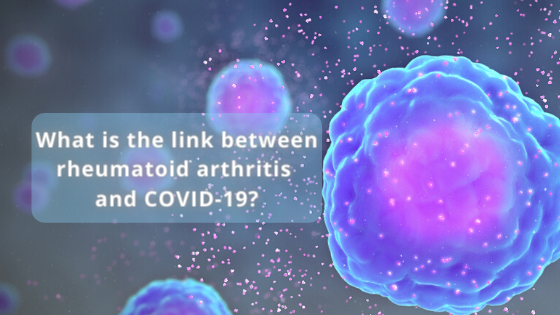If you’ve been following the COVID-19 news (is it even possible to avoid it?), you may have noticed that a lot of the drugs being used to treat the disease are originally intended as treatments for rheumatoid arthritis. How can they be used to help coronavirus patients? Read on to find out!
First of all, let’s talk about what rheumatoid arthritis (RA) actually is. RA is an autoimmune, musculoskeletal, inflammatory disease which mainly affects the joints. That’s a bit of a mouthful, let’s break it down further:
- Autoimmune: the disease occurs when the body’s own immune system attacks itself
- Musculoskeletal: the disease affects the muscles and bones
- Inflammatory: the disease is characterized by excessive inflammation
The symptoms of RA include pain, swelling, and stiffness in the joints, but there can also be extraarticular manifestations (meaning that symptoms appear in places other than the joints) which affect the heart, lungs, eyes, and other organs. Scientists still aren’t completely sure what causes RA, but it is thought to be a combination of genetic risk factors and environmental triggers such as smoking, obesity, and even gum disease.
Many drugs to treat RA are anti-inflammatory; inhibiting signaling pathways involved in inflammation, and it is this property that makes them useful in treating COVID-19.
The virus that causes COVID-19, Sars-COV-2, predominantly affects the lungs and can lead to uncontrolled immune activation and excessive inflammation. This ‘overreaction’ of the body’s immune system is sometimes known as a cytokine storm.
Have you read our post on the front-runners in the COVID-19 vaccine race?

Cytokines are small proteins involved in cell signaling that help cells coordinate their inflammatory response to an injury or infection. There are several different types of cytokines that work via different signaling pathways. If signals in these pathways can be blocked, then it is thought that the resulting inflammation can be reduced.
How can RA drugs prevent cytokine storms?
Drugs that block signaling cytokines, or other molecules that regulate the production of cytokines, are regularly used as treatments for RA, aiming to reduce inflammation. One such drug is called baricitinib and is being trialed in patients with COVID-19.
[bctt tweet="Many drugs to treat RA are anti-inflammatory; making them useful in treating COVID-19."]
Baricitinib works by blocking Janus kinase, an enzyme involved in cellular signaling that can lead to inflammation. Blocking the action of this enzyme will, in theory, reduce the number of cytokines activated, thus preventing cytokine storm and the damage associated with it. In a study of 12 patients, baricitinib was found to improve COVID symptoms and outcomes. It is currently being tested in Phase 3 trials by pharmaceutical company Eli Lilly.
Read our answers to some of your COVID-19 questions here!
Other RA drugs, including tocilizumab and tofacitinib, are also being trialled for use as a COVID-19 treatment. These are all examples of drug repositioning; when a drug originally intended for the treatment of one disease is recommended for the treatment of another. Drug repositioning is often used in rare diseases, where there is little funding available to investigate completely new drugs, so researchers often have to turn to existing drugs to try and reduce costs.
We hope this post has given you an insight into the link between rheumatoid arthritis and COVID-19! Whilst it’s great that there are so many drugs showing potential as treatments for the coronavirus, it is still important to be sensible; stay home as much as possible, keep your distance, and keep washing your hands often!
Further reading:
https://www.ncbi.nlm.nih.gov/pmc/articles/PMC3294426/




